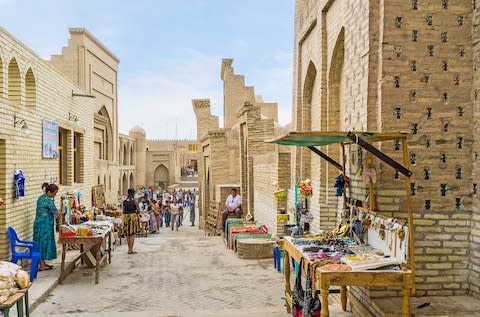The countries making it easier for you to visit

Stuffy bureaucrats and lengthy waits at visa offices are becoming a thing of the past – thankfully
It can be easy, in this time of political turbulence, to see walls rising wherever you look – from the physical barrier that the US president wants to build on the Mexican border to the metaphorical type that may yet appear between this country and continental Europe, particularly if the Brexit stalemate resolves itself as a no-deal departure come October 31.
But whatever your stance on Britain’s future relationship with Brussels, red tape and paperwork are rarely friends of the traveller – and those who perceive the planet to be narrowing may fear a coming era of trickier journeys and delays at airport passport desks.
And yet, travel is – in certain places – becoming easier, as countries seek to lure visitors who have not previously considered their cities or key sites. One of these is Uzbekistan – which, in February, introduced visa-free entry for stays of up to 30 days, for citizens of 45 countries, including the UK.
This means straightforward access to places on the fabled Silk Road, such as the grand city of Samarkand, with its shrines and madrasas (colleges).

Kazakhstan, land of futuristic skyscrapers and Borat, signed a visa-free arrangement with the UK in 2014 (for stays up to 30 days) and now three of the five Central Asian “stans” can be visited without a visa (the third being Kyrgyzstan). It has been suggested that Tajikistan could follow suit in the coming years (it currently uses an e-visa system).
Of course, if a landlocked Central Asian republic is not to your taste, there is always notably sea-facing Vietnam, which introduced a visa-waiver policy for 24 nations in 2015. Initially, this was to be a year-long experiment, but the trial has been such a success that, last summer, it was extended until June 2021 (and is likely to become permanent). At present, it lets British passport holders stay for up to 15 days; long enough to see the core attractions. If you are planning a more detailed odyssey, you can apply online (at https://evisa.xuatnhapcanh.gov.vn) for a 30-day e-visa (for US$25/£20).

Sri Lanka also intends to open its doors a little wider. It had planned to install a free visa-on-arrival scheme for citizens of 36 countries (including the UK) at the start of May – but put the idea on ice following the terror attacks in Colombo and Negombo on Easter Sunday. Recent murmurs from its Ministry of Foreign Affairs suggest the delay will be temporary.

Elsewhere, semi-remote Madagascar brought itself closer to the rest of the globe in May, launching an electronic visa system (evisamada.gov.mg). Would-be explorers of this vast island now have three choices: a 30-day visa for $37, or 60- and 90-day options for $45 and $55 respectively. These are single-entry permits – but are sufficiently modern that they can be presented on a smartphone.
Nor is this a sole case of African innovation. Ethiopia launched an e-visa option in June 2017 (only for those arriving via Addis Ababa Bole International Airport) and Egypt debuted an e-visa last summer, which is available to 46 countries and valid for up to three months, single entry (visa2egypt.gov.eg; $25). While you can still obtain a visa on arrival for the same fee, the e-version is designed to reduce queues at airports. I applied for one in March, and found the procedure quick and simple.

India has been paddling in similar waters. Previous travellers to this glorious but often overly bureaucratic country will recall lengthy queues at visa centres in London, Birmingham and Edinburgh. But as of 2014, the need to apply in person has been sidelined in favour of an e-visa system (indianvisaonline.gov.in) that saves an awful lot of time. At first, this applied to citizens of some 40 countries, for visits of up to 90 days. In January, this was broadened to 167 countries and a grace period of up to a year – with multiple entries allowed, at 28 airports and five ports. At a basic $100, plus administrative fees, the visa still isn’t cheap for Britons – but the process of obtaining it is now far less painful.

Is this a trend? It is sure to be – as countries try to keep a sharper eye on those who cross their thresholds. Russia – another giant that likes to keep potential tourists waiting in dingy visa offices – is also now dabbling in e-visas. These are only, at present, on offer in its Far East and its Kaliningrad exclave – and not available to citizens of European states. But with a nationwide roll-out pencilled in for January 2021, this may yet change, meaning less time in a line on the way to St Petersburg and Moscow.
Best of the rest
Whether your conscience and ethics permit a trip to Saudi Arabia is another matter, but the country recently started issuing tourist visas for the first time. Last year the news agency Reuters reported on what it described as the first “trickle” of western travellers into Saudi Arabia – many of whom flew to the capital Riyadh for a Formula E (the new, relatively more eco-minded form of motorsports that uses electric cars) race meeting.
Since 2017, Belarus has permitted Britons to visit without a trip to its diplomatic mission in London’s Kensington Gardens (they must, however, fly in via the capital Minsk, hold a valid insurance policy, and leave within five days).
For something really off-beat, there is Benin, which launched an e-visa system in April 2018. “Benin is known as the cradle of voodoo and its Ouidah Voodoo Festival is fascinating,” wrote Sue Watt for Telegraph Travel last year. “Believers are absorbed by rites and rituals around the voodoo temples involving dances and trances, fetishes and sacrifices (usually chickens but also goats), all in devotion to their gods. Prepare for a sensory overload and a unique cultural experience.” A 12-day tour of Togo, Ghana and Benin taking in the Ouidah Voodoo Festival is offered by Undiscovered Destinations.
Britons have been able to visit South Africa without a visa for many years, but until recently there was a significant hurdle for families hoping to go there. For the last three years anyone travelling with a child to the country was required to carry their unabridged birth certificates or face being turned away at the airport. The unique rule, aimed at tackling human trafficking, caught out hundreds of UK families, many of which had to cancel their holidays and lost thousands of pounds. Since December 2018, however, the regulation has been relaxed.

